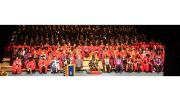
Rhodes University celebrated a new University record of 75 PhD degrees at six graduation ceremonies beating the previous record of 71 in 2014.
Five honorary doctorates were also awarded. These included Mr Hugh Masekela, Adv. Thuli Madonsela, Dr David Koloane, Dr Saleem Badat and Prof. Frances Lund.
Speaking at the 1820 Settlers National Monument Dr Mabizela said that these awards are made to “women and men whose significant achievements and distinction in some field or activity of human endeavour set them apart from others, and are consonant with our institutional mission, purposes and values.”
This year a total of 2 298 students graduated. Over half or 1 244 of these were undergraduate Bachelor’s degrees and 1054 (or 46%) were postgraduate degrees and diplomas.
Of the 1 054 postgraduate students, 281 graduates received their Master’s degrees.
The Faculty of Science, while being the third largest faculty on campus produced more PhDs than all the other five Faculties combined. The Faculty of Humanities increased their PhD output from 12 in 2014 to 16.
This year of the 2 298 graduates, 61% were women, up from 60% last year, and 23% were international students, also up from 21% last year.
“In a society characterised by incertitude, cynicism and despair, we look to you, graduates of this distinct and distinctive institution of higher learning, for leadership to tackle the challenges that face our society and the world,” said Dr Mabizela.
Dr Mabizela also took the opportunity to thank both academic and support staff for the roles they have played in ensuring students achieve success.
“If I may be so bold, let me, on your behalf, express profound gratitude and sincere appreciation to your lecturers, tutors, laboratory technicians, computer assistants, support and administrative staff for their guidance, mentoring, support and encouragement during the trying times of your studies. Your success is their just reward!”
“I hope you will also be the first to acknowledge the important role played by the cleaners, cooks, gardeners, janitorial staff, wardening staff, student leadership and sport societies and clubs in creating a rich and supportive intellectual, social and physical environment for you to develop, grow and succeed in your academic endeavours,” he added.
Each graduation ceremony also had a moment of silence in memory of the lives lost at Garissa University.
“As we gather to celebrate exceptional achievements and the future promise of our students, our thoughts and prayers go out to the students and staff of Garissa University in Kenya, who are struggling with grief and shock as they try to make sense of the cold-blooded, senseless and violent killing of 148 students on their campus. Our hearts go out to the parents, friends and relatives who lost their loved ones in that barbaric act of brutality,” said Dr Mabizela.
Dr Mabizela also highlighted the social ills in our country of poverty, unemployment and the slow pace of economic and social advancement of the poor and marginalised. He further discussed the challenges facing institutions of higher learning especially that of transformation.
"In the context of higher education, central to the issue of transformation are the key questions of: what we teach, who teaches, how we teach, how we assess, recognition and appreciation of different lived experiences that students bring with them in class, taking cognisance of different learning styles of our students, what we value as knowledge, which scholarly voices are heard and which ones are silenced, recognition and celebration of diversity and difference and leveraging on then to create a rich learning experience for our students, social and demographic composition of our academic and support staff, daily discourses and the assumptions we make about each other, experiences of exclusion, and so on. These are some of the important questions we must critically reflect on and address if we are to become a genuinely African university and not just a university in Africa," he said.
At his inauguration earlier this year, Dr Mabizela made two commitments, First, that Rhodes University would be accessible to students from poor, rural and working class backgrounds so that they can benefit from the outstanding educational experiences it offers. And secondly that he would make it his personal mission to strive to ensure that no academically talented, but financially needy, student is turned away from Rhodes University.
“My final appeal to you is that you help us live up to these important commitments by contributing generously to our Alumni Annual Fund and other fundraising efforts. Your support is vital if we are to continue to make the learning experiences we value so greatly here at Rhodes University more available to all,” concluded Dr Mabizela before leaving graduates with Mahatma Ghandi’s injunction that we should “live simply so others may simply live”.
Click through for Dr Mabizela's full address Graduation Ceremonies 2015 Dr Mabizela
